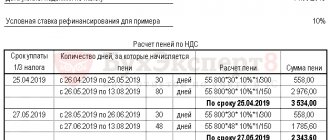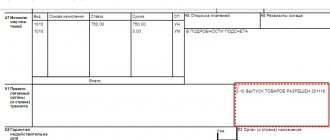Confirmation of the zero VAT rate VAT is an indirect tax levy introduced to withdraw in favor of the budget a certain part of the cost of services, goods or work.
The amount of value on which tax is levied is formed throughout the entire process of creating a product, and VAT is transferred to the budget after the product or service is sold in a free market. This state of affairs increases the cost of production and reduces its competitiveness. However, in some cases the law establishes a zero tax rate . Entrepreneurs are interested in when the zero percent VAT rate is applied and under what conditions such a relaxation can be achieved by the Federal Tax Service.
Types of VAT rates
First, let’s figure out what types of VAT there are and how much money at each rate, and most importantly, under what conditions, will have to be transferred to the budget:
- VAT 18%. The main value added tax introduced as a surcharge to the tariff or price.
- The 0% VAT rate is established by the Tax Code, determined by clause 1 of Art. 164. It applies to products exported from the country under the export customs procedure and included in the free zone, however, provided that the documents specified in Art. 165 NK. Services and goods officially used by international companies and their Russian representative offices on the basis of international treaties requiring tax exemption are subject to the zero rate.
- VAT 10% is paid on the basis of clause 2 of Art. 164 NK. This applies to food products, children's products, medical equipment and medicines, as well as products related to culture, books, science, and the education system.
A special case
In a situation where the goods are placed under a customs procedure in a free customs zone, then the following must be submitted:
- agreement (copy of the agreement) concluded with the resident;
- a certificate (copy of the certificate) is provided, indicating the registration of the person as a resident of the special economic zone;
- bank statement (copy of bank statement) as well as a copy of the cash receipt order, which confirms the receipt of revenue;
- customs declaration (copy of the customs declaration) with the necessary marks from the customs service.
When does the 0% VAT rate apply?
Let's look in detail at when the 0% VAT rate is applied, and which entrepreneurs can count on preferential taxation in relation to the goods and services produced.
This concerns, first of all, export activities, which make it possible to attract foreign exchange earnings to Russia. A taxpayer trading with counterparties in other countries has the right to submit an application, as a result of which the state will return to him the value added tax he previously paid.
A zero VAT rate is established for the export of goods and services outside the EAEU. Tax authorities and customs officers verify the data provided by the entrepreneur and specified in the regulatory documentation. It is necessary to confirm the zero rate by providing a package of documents. This is easier to do for companies specializing in transporting goods using standard transport.
Top 10 countries buying Russian goods in 2021:
| China | $60.6 billion |
| Netherlands | $46 billion |
| Germany | $36.6 billion |
| Belarus | $23.7 billion |
| Türkiye | $23.3 billion |
| South Korea | $18.5 billion |
| Poland | $17.9 billion |
| Italy | $17.9 billion |
| Kazakhstan | $14 billion |
| USA | $13.5 billion |
Source: Ru-stat.
Rules for confirming the zero VAT rate
Important! The company cannot trade for export at a zero rate in supplies belonging to the category of goods of special importance for Russia, in particular resources. This is allowed if documents confirming the VAT rate of 0% are presented:
- a contract between authorized persons and taxpayers confirming the conduct of trade outside the Russian Federation;
- a customs declaration, which serves as confirmation that the goods have been checked and sent abroad through an official control point;
- accompanying and transport documents with customs marks authorizing the shipment of a specific type of goods.
If the product is planned to be sold through intermediaries, then you will have to draw up an agreement for this person, signed by both parties and indicating information about all citizens participating in the transaction and a description of the product itself. It is necessary to comply with the deadline for confirming the 0 VAT rate for export, which is 180 days after the customs declaration has been completed.
Attention! A desk review of the submitted documents will be carried out within 3 months.
The tax service checks documents to identify errors and the accuracy of the information provided. If suspicions arise related to inconsistencies in the data provided, the Federal Tax Service authorities require additional documents from the taxpayer to confirm that he is right. If documents confirming the 0 VAT rate for exports are not provided at the request of Federal Tax Service employees, then the tax authorities will decide that the information provided is inconsistent. When the papers are sent to the Federal Tax Service, but later than the established period, namely 180 days, then a VAT of 10 or 18% is imposed on products exported abroad, depending on the product category. If the taxpayer was seriously late in submitting documents, he will additionally pay a penalty.
In what cases is tax charged?
For companies and individual entrepreneurs who are VAT payers in accordance with the chosen taxation system, the need to pay added value arises in the following cases:
- Manufactured products have been sold, paid services have been provided or work has been carried out;
- Property or assets transferred free of charge
- Construction, installation and other works related to modernization were completed for the company’s own needs;
- Import has been completed.
Sale or transfer, provision of services, assets, etc. on a paid or free basis, in any case accompanied by a change in the volume of financial resources in the organization’s accounts. If such a change occurs, the tax office will be able to track the transaction, and if it is not properly included in the reporting and is not accompanied by contributions, then claims will arise regarding the organization’s activities.
Other cases when payment of tax costs is not required are given in Article 149 of the Tax Code of the Russian Federation. Also, for organizations operating under the simplified tax system and other taxation schemes that do not involve VAT deductions, they are given the opportunity to submit zero reporting in the declaration. Zero reporting is submitted by companies whose activities are related to seasonal work and have significant downtime in their work. More detailed information can be found in the Tax Code of the Russian Federation.
How is payment made in 2021?
In 2021, there is a major change in the system of payment for added value accruals. In particular, the percentage increases from 18% to 20%. This unpopular measure is being taken to increase budget revenues, which will then be directed to the implementation of national projects and strategic areas of government activity.
However, apart from the increase, no more changes are expected and delivery will be carried out according to the same scheme as usual. Tax reporting is prepared quarterly, which is then submitted to the Federal Tax Service office with regional reference to the place of registration of the company. Payment is made after reporting, within the next month no later than the 25th. If the declaration was submitted with an incorrect amount and this was discovered by the payer himself, he can provide a corrected version. If an error is discovered during an inspection by Federal Tax Service employees, you should expect an inspection. Since such errors are equated to forgery, which will be accompanied by proceedings and appropriate sanctions.
Companies engaged in exporting and operating at a zero rate also provide reports indicating the necessary data. Organizations whose activities during the reporting period did not involve carrying out commercial and business operations provide zero reporting data. In any case, if the company has not been declared bankrupt and is registered with the Federal Tax Service, it must provide the necessary reporting information. More information can be obtained on the Federal Tax Service website or by contacting the service branch in the city or region of residence.
Help in calculating VAT can be obtained on our website using a special calculator.
Determination of the VAT rate for the sale of goods and services through commission agents
If the goods are sold through a commission agent, then VAT is charged at the time of shipment of products to consumers or at the time they transfer the prepayment. When the product is transferred to commission agents, no taxable transactions are created. The primary document related to the sale of products can serve as confirmation of a specific transaction, and the formation of a taxable object occurs only in relation to this transaction.
It is important to know! Raising VAT to 20 percent - what threatens business and ordinary citizens?
Consequently, confirmation of the zero VAT rate for exports when working with commission agents is not required and this is due to the provisions specified in Art. 167 of the Tax Code of Russia. This article defines special rules related to the formation of the tax base for the sale of products involving third parties. A prerequisite is the conclusion of appropriate agreements of assignments, agency agreements and commissions. Consequently, the taxpayer establishes the tax base in accordance with the requirements of Art. 167 of the Tax Code, if a commission agent is hired to sell the product.
When establishing VAT on exports, confirmation of the zero rate on the declaration is not required when commission agents participate in trade operations on the basis of the plenary resolution of the Supreme Arbitration Court of the Russian Federation No. 33, adopted on May 30, 2014.
Contract
A contract (copy of a contract) for the supply of exported goods or for the performance of work (provision of services) related to the export of goods (import of goods) is a mandatory document that is submitted to the tax office to confirm the right to apply the zero VAT rate (subclause 1, paragraph. 1 Article 165 of the Tax Code of the Russian Federation).
From 2021, a contract can be submitted not only as one document. It can be replaced by several documents. The main thing is that the parties to the transaction reach written agreement on all its essential terms: the subject of the contract, price, deadlines for fulfilling obligations, the name of the parties to the transaction. This is stated in paragraph 19 of Article 165 of the Tax Code of the Russian Federation.
If the organization does not have a contract, for example, if goods are exported abroad, the buyer of which is a Russian organization, a zero VAT rate cannot be applied. Such clarifications are given in letters of the Ministry of Finance of Russia dated May 8, 2013 No. 03-07-08/16131, Federal Tax Service of Russia dated October 17, 2013 No. ED-4-3/18594 (posted on the official website of the tax department in the section “Letters, sent to the territorial tax authorities").
If goods are sold through an intermediary, the exporting organization represents:
- mediation agreement;
- a contract between an intermediary and a foreign counterparty providing for the supply of goods belonging to the exporting organization.
This procedure is provided for in subparagraphs 1 and 2 of paragraph 2 of Article 165 of the Tax Code of the Russian Federation.
When performing work or services related to the export of goods (import of goods), the following are provided:
- contracts concluded with Russian counterparties - if the customers of the work (services) are Russian organizations;
- contracts concluded with foreign counterparties - if the customers of work (services) are foreign organizations.
This follows from the provisions of subclause 1 of clause 3.1, subclause 1 of clause 3.2, subclause 1 of clause 3.3, subclause 1 of clause 3.4, subclause 1 of clause 3.5, subclause 1 of clause 3.6, subclause 1 of clause 3.7, subclause 1 of clause 3.8, subclause 1 of clause 4, subclause 1 paragraph 14 of article 165 of the Tax Code of the Russian Federation.
Delay in submitting documents for VAT confirmation when exporting: what to do?
Entrepreneurs should be especially careful about delays when submitting documents to confirm the zero rate. If legal entities do not meet the allotted 180 days from the moment the products are placed under the export customs procedure carried out in accordance with clause 9 of Art. 165 of the Tax Code, the Federal Tax Service decides to calculate value added tax at a rate of 18% or 10%.
This is done in accordance with the provisions specified in the third paragraph of Art. 165 clause 9, and the tax base is calculated from the date of shipment, which is why legal entities are forced to confirm the 0 VAT rate through an updated declaration, including the shipment period in accordance with the requirements specified in Articles 81 and 167 of the Tax Code. Companies that fail to submit the necessary documents within 180 days are considered legal entities that have caused damage to the budget and for them, on the basis of Art. 75 of the Tax Code do not accrue penalties, since there are no grounds in this case, since the obligation to pay tax begins on the 181st day.
You must pay penalties, in accordance with the requirements of the Supreme Arbitration Court of the Russian Federation, if VAT has not been paid after 181 days, guided by regulation No. 15326/05, adopted in May 2006. Despite the fact that lower courts take the side of taxpayers, as follows from Resolution No. A65-20208/2010, issued for the FAS in the Volga region in July 2011. Despite this, if confirmation of the 0 VAT rate for export is not completed within the established time frame, the FAS insists that penalties must be calculated from the moment of shipment, which is communicated to the territorial inspectorates in letters from the Ministry of Finance.
Interesting fact! This point is practically not regulated by precise legislative norms, so if the taxpayer does not want to sort things out with the territorial tax inspectorate in court, then it is better to calculate penalties from the date of shipment.
If there is a delay, then confirmation of the zero VAT rate is carried out according to the following algorithm:
- submission of an updated declaration taking into account the shipment period;
- be sure to fill out section No. 6 in the declaration;
- transfer penalties and tax to the budget at the VAT rate determined by the inspection;
- submit an updated declaration for the first quarter, entering the necessary information in section IV;
- reflect VAT on line 040 of section IV, indicating the amount contributed in connection with unconfirmed exports.
The specified amount will reduce the tax fee that must be paid in accordance with the submitted declaration.
Features of judicial practice
In judicial practice, confusion often arises regarding the application of various provisions on deductions associated with different periods.
Thus, from the decision of April 24, 2021 in case No. A32-870 AS of the Krasnodar Territory, we learn that the conclusion of the initial court that, taking into account Art. 272, which establishes the rule that the date of recognition of tax amounts as expenses is the date of their accrual, the disputed amounts of VAT were subject to reflection in expenses for 2004 - 2005, i.e. in the period when the period of 180 days specified in paragraph 9 expired the article in question and art. 167 of the Tax Code of the Russian Federation, and not in the period of expiration of the three-year period, during which the right to apply the 0% rate could be confirmed, was made without taking into account the fact that the disputed VAT amounts were accrued on a later period and on another basis, and not because during the established the required package of documents was not collected within the deadline to confirm the right to apply the 0% rate.





